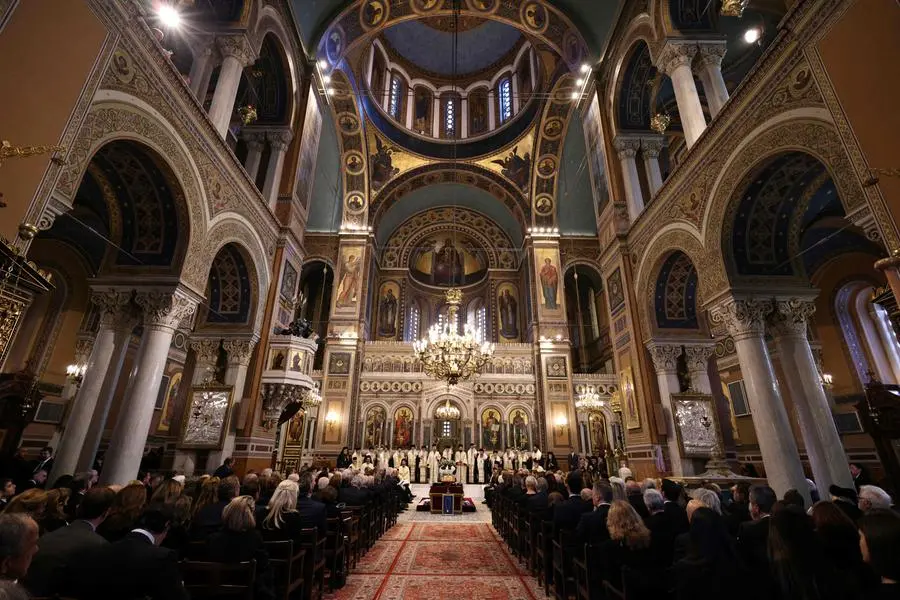PHOTO
Dozens of European royals and hundreds of Greeks gathered in Athens on Monday for the funeral of Greece's last king, Constantine II, who died last week aged 82.
Royals from Britain, Denmark, Luxembourg, Monaco, the Netherlands, Norway and Spain flew in for the service, which has caused controversy.
Constantine was a divisive figure in the country's history and the government drew criticism from conservatives after deciding not to grant him the honour of a state funeral.
Ex-prime minister Antonis Samaras was among those who said Constantine, a former Olympic gold medallist for Greece, deserved to be buried as a former head of state.
From dawn on Monday, at least 2,000 people according to state television ERT had queued outside the Athens Metropolitan Cathedral to pay their respects.
Some clutched flags of the royal era, flowers and portraits of the ex-king and his wife, the Danish princess Anne-Marie. Many bowed and kissed the coffin, which was covered with the Greek flag.
"He was an honourable man, a proper family man who never harmed Greece," pensioner Fotis Stamatiou, 85, told AFP.
"We are here to accord our king the honour he deserves...we love him," added fellow pensioner Arietta Papadaki.
The private service officiated by Archbishop Ieronymos, head of the Orthodox church of Greece, began shortly after noon with almost 200 guests attending.
The entire royal family of Spain, Denmark's Queen Margrethe II and Crown Prince Frederik, the Swedish royal family, the king and queen of the Netherlands, Grand Duke of Luxembourg Henri, Norway's Crown Prince Haakon, and Monaco's Prince Albert II were in attendance, arriving to applause from the crowd.
The British Crown was represented by Princess Anne, daughter of the late queen Elizabeth II.
Greek Prime Minister Kyriakos Mitsotakis and President Katerina Sakellaropoulou did not attend the funeral, with the government represented by Deputy Prime Minister Panagiotis Pikrammenos and Culture and Sports Minister Lina Mendoni.
Toppled by coup
Surveys in past decades have shown most Greeks feel either indifference or resentment towards the former king.
The last member of a century-long dynasty, Constantine had reigned for just three years when a brutal army dictatorship seized control of the country in 1967.
Declassified US diplomatic cables say Constantine may have been mulling martial law himself prior to the coup.
Nearly eight months after the junta seized power, Constantine organised a military counter-coup that failed.
He fled to Rome with the rest of the royal family, and later to London.
The junta abolished the monarchy in 1973, and Greeks voted not to restore the royal family after the restoration of democracy in 1974.
Later locked in a bitter property dispute with the Greek state, Constantine had his Greek citizenship revoked in 1994.
The ex-king returned to Greece in 2013, selling the 9,500-square-foot (880-square-metre) London mansion where his family had lived for four decades.
'Kingdom of Greece no longer exists'
The day after Constantine's death in a private Athens hospital, the prime minister announced the funeral would be held privately.
Mitsotakis insisted on Saturday it was the right decision, stressing that the former king was the leader of the "Kingdom of Greece, which no longer exists".
He said history "will judge Constantine fairly and harshly".
After the funeral service, Constantine's body will be transferred to the royal cemetery in Tatoi, about 29 kilometres (18 miles) north of Athens.
There was a frantic race over the weekend to prepare the site, which nearly burned down in a 2021 summer wildfire.
Most members of the former royal family are buried at the former royal summer palace at Tatoi, including the dynasty's Danish-born founder George I.
Constantine was married to Anne-Marie -- sister to Denmark's Queen Margrethe -- and they had five children.
As crown prince, he won a sailing gold medal in the 1960 Rome Olympics and was an honorary member of the International Olympic Committee.





















